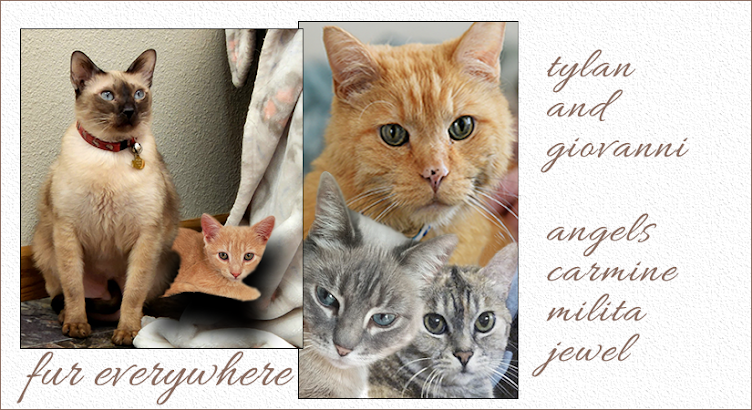First, I wanted to thank all of the kitties and kitty parents who left me purrs and/or purrayers and/or nice thoughts on my last post. I appreciate the outpouring of support so much. Please continue to purr and purray for me, if you don't mind. I just hope the situation works out the way it is supposed to. Thanks!
Now for today's post: I thought I'd pass this information along because I know that a lot of older cats, especially females, suffer from this and it would be wonderful if we could find new, better treatments for kidney disease. Our sweet, sweet Emma was taken from us by this disease. She's now an angel watching us all from the Rainbow Bridge.
Colorado State University's Veterinary Teaching Hospital, located in Fort Collins, Colorado, is currently looking for felines with chronic kidney disease to participate in clinical trials aimed at discovering new treatments for the disease. Please note that while these studies are being conducted in Colorado, not all of the clinical trials require felines to be seen in Colorado; felines from around the nation are eligible to participate in some of these studies as well.
Stem Cell Therapy: In laboratories, it has been shown that stem cells improve levels of excess protein in the urine, improve the function of the kidneys, and decrease scarring and inflammation in the kidneys. Cats who have stable chronic renal disease are invited to participate in this clinical trial where they will receive three IV injections of stem cells over several visits with a veterinarian. Felines' kidney function will be monitored throughout the study. This study does require that your kitty visit the Veterinary Teaching Hospital in Colorado a total of five times.
All lab work, veterinary visits, stem cell treatments, and a $200 stipend for the owner are paid by Colorado State University's Frankie's Fund for Feline Stem Cell Research and the Morris Animal Hospital. Felines who may not qualify for this clinical trial include those with other disease, kidney stones, heart disease, kidney infection, or other renal complications.
Vitamin E Supplementation: Felines with stable chronic kidney disease, especially those with anemia, are sought for this clinical trial. The study aims to discover whether vitamin E supplements will improve a cat's antioxidant status and anemia, if applicable. Felines who do not have anemia can also participate in this study. After some initial laboratory work, kitties will either receive a placebo or a small amount of liquid vitamin E each day for a duration of three months. Cats will need to visit a veterinarian after one and two months of supplementation for a brief visit. After three months of supplementation, cats will need to visit the vet for additional tests as well.
Kitties who are not eligible for this study include those who are undergoing erythropoietin and those who possess other illnesses. All lab work, veterinary visits, and recheck visits will come at no charge to the owner. Felines from around the nation are eligible to participate.
Appetite Stimulation and Anti-Nausea with Mirtazapine: Another study felines from around the nation can participate in is this study on mirtazapine, which is a new appetite stimulant that also possesses anti-nausea properties. Cats in the study will be given either an appetite stimulant or a placebo every other day for the duration of two weeks. Felines will then cross into the other group for two weeks. Vet visits are required at the beginning, middle, and end of the clinical trial.
All vet visits and lab work are paid for by the study. At home, owners will be required to record observations about their kitties' attitude and appetite. In addition, all cats who are enrolled in the study will receive a two-month supply of mirtazapine and a six-month supply of Purina kidney diet cat food. Those who are not eligible for this study include cats with kidney infection or any other uncontrolled conditions.
Urine Culture Technique: Felines with kidney disease are prone to contracting a difficult to diagnose type of bacterial kidney infection called pyelonephritis. This clinical trial aims to determine if a new test is accurate in diagnosing this type of kidney infection when compared to standard tests. Kitties who are eligible to participate include those who currently possess pyelonephritis, those who are suspected to have pyelonephritis, and those who have a urinary tract infection. Participating cats will receive a kidney ultrasound and all laboratory tests needed for the study. Those who have been treated with antibiotics are not eligible to participate.
Cerenia for the Treatment of Nausea: Kitties who possess stable chronic kidney disease and who experience nausea, are "picky eaters," or experience vomiting may be eligible to participate in this clinical trial. Cats will need to have a physical exam and chemistry panel done by a veterinarian both before and after the trial, which will be paid for by the study. All cats will either receive Cerenia, a drug that decreases nausea, or a placebo for a duration of two weeks. During the two-week trial, cat owners will need to fill out a daily diary of the feline's behavior as well. Cats who possess other health conditions may not be able to participate in this study.
Kidney Samples: Colorado State University's Veterinary Teaching Hospital is also offering free private cremation services to owners whose furry friends have gone to the Rainbow Bridge due to kidney failure. The veterinarians would like to study samples of deceased cats' kidneys in order to study how the cells age, if again plays a part in kidney disease, to better comprehend the stages of kidney disease, and to determine if a lack of appetite and nausea in felines with kidney failure is caused by a specific condition.
All of the deceased cat's ashes will be returned to the owner within about a week.
If you are interested in more information or wish to enroll a cat in any of these studies, you may contact Jessica Quimby, DVM at 970-297-5000.
Source:

